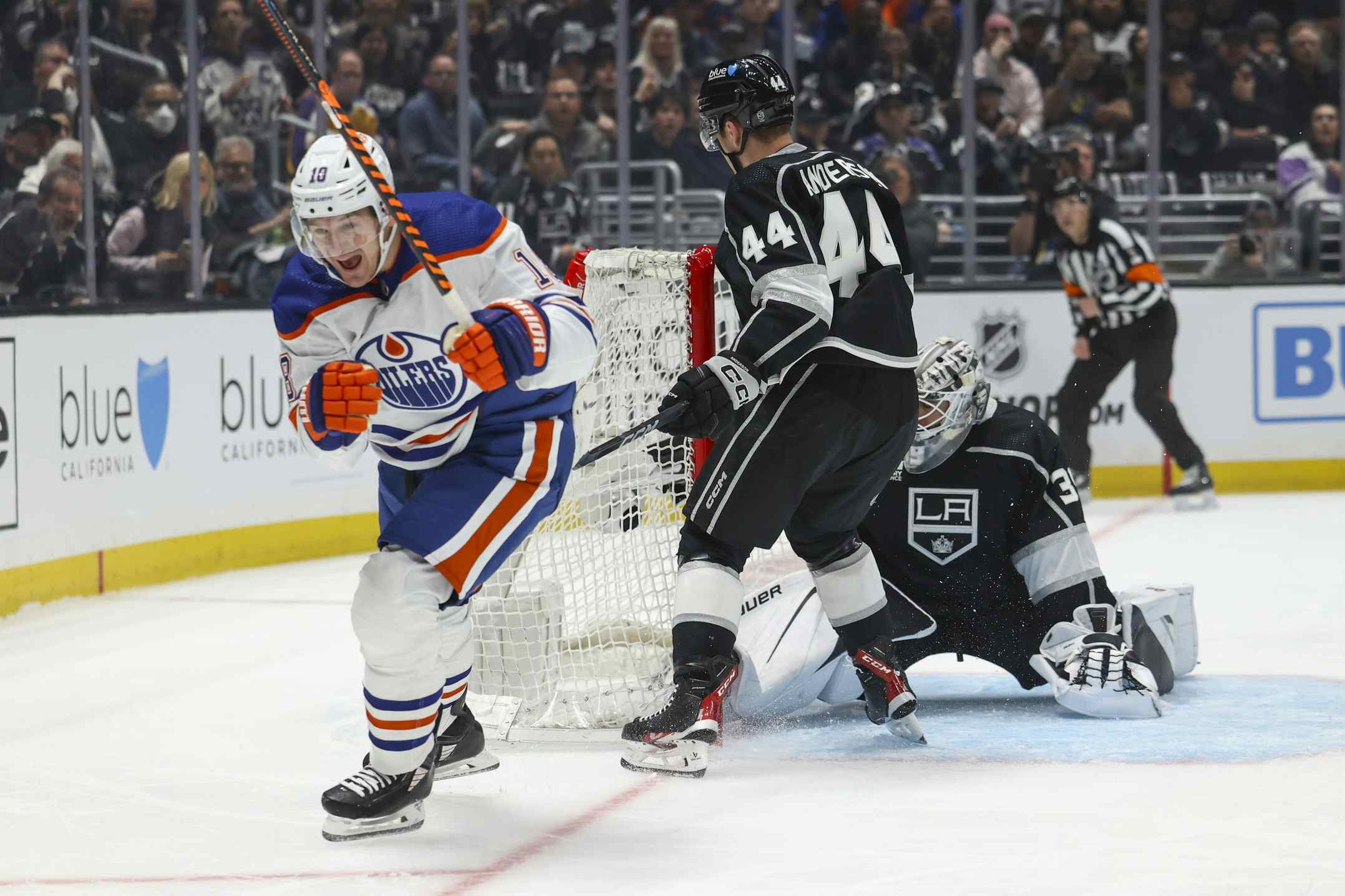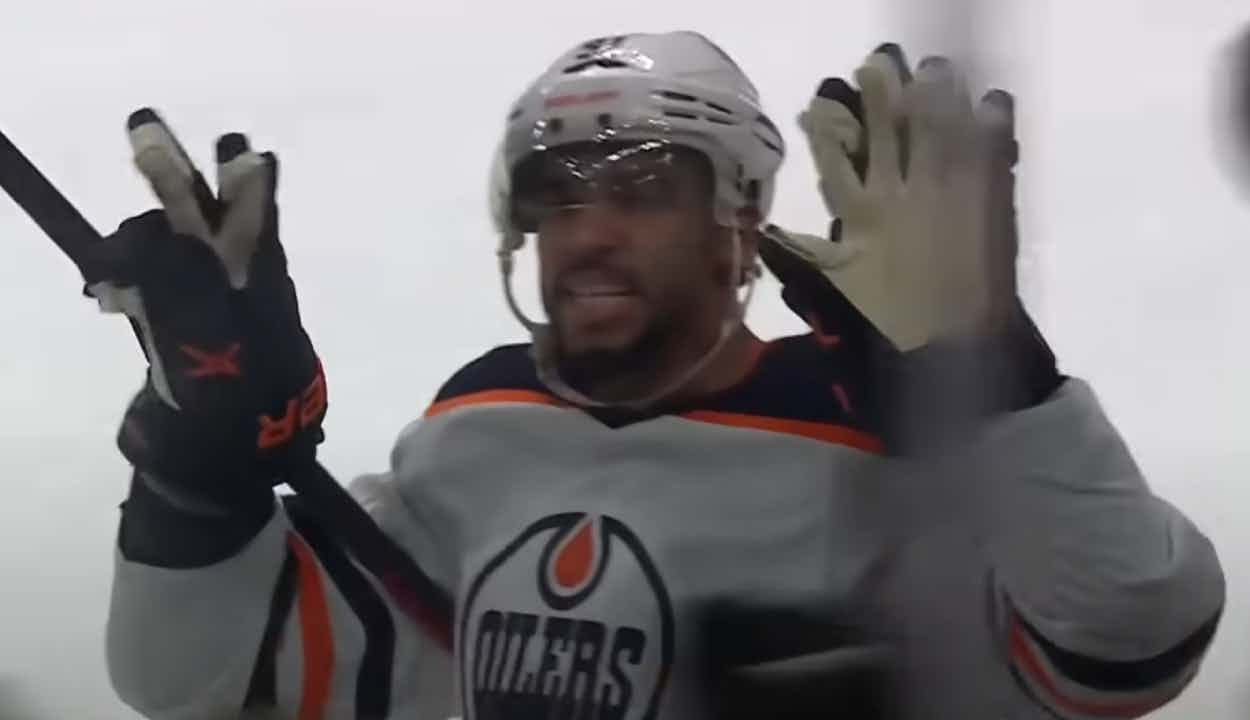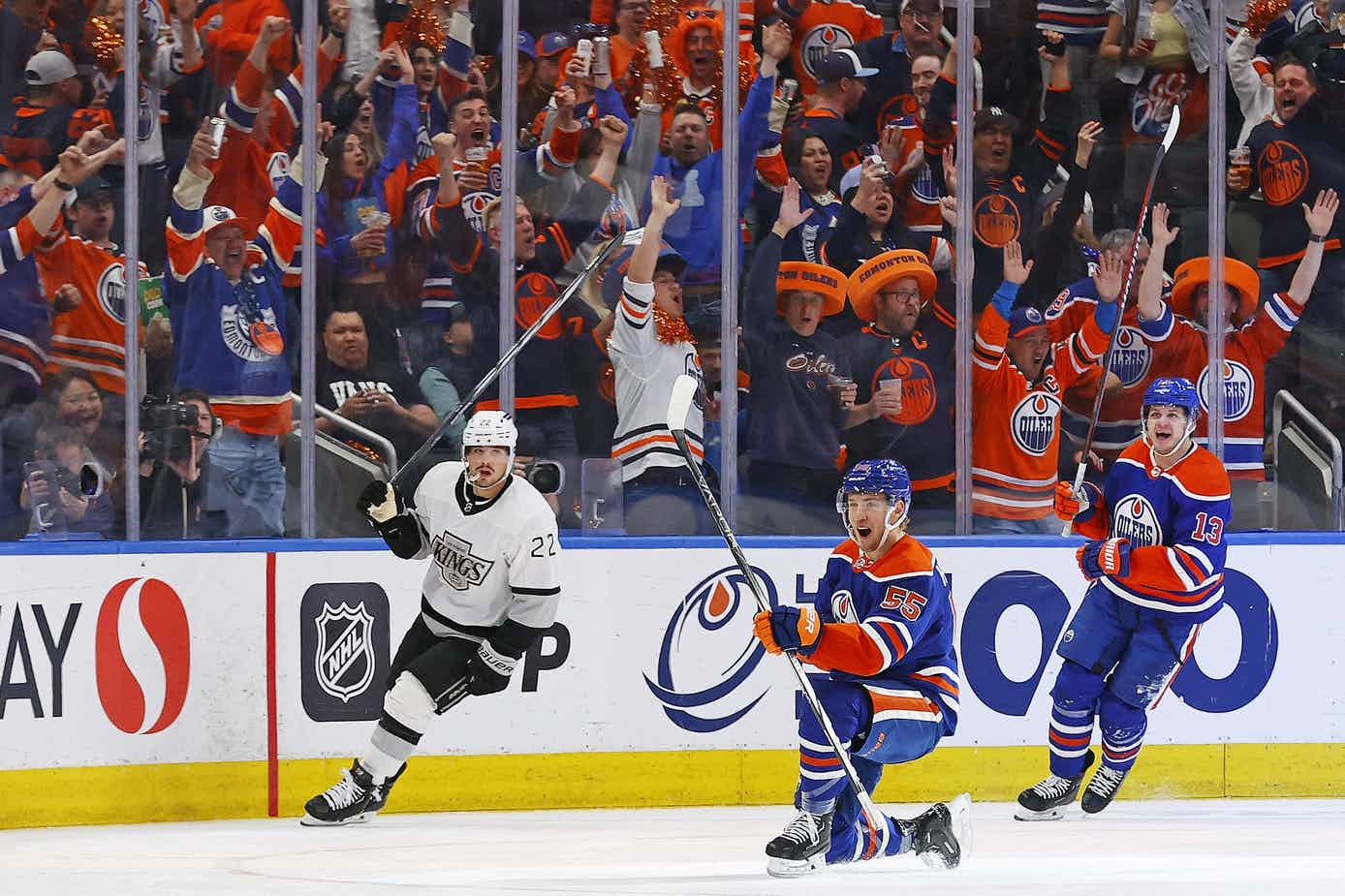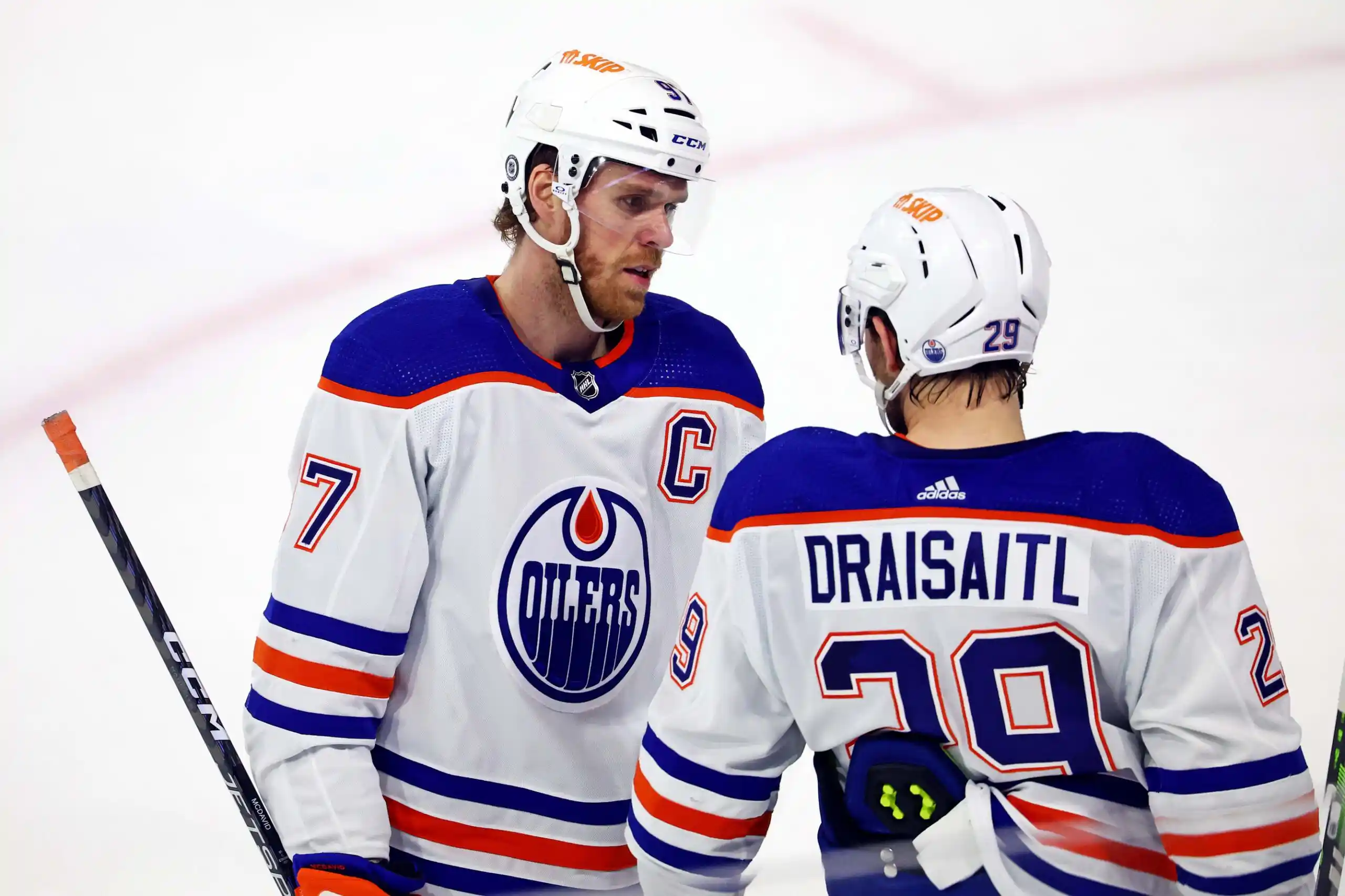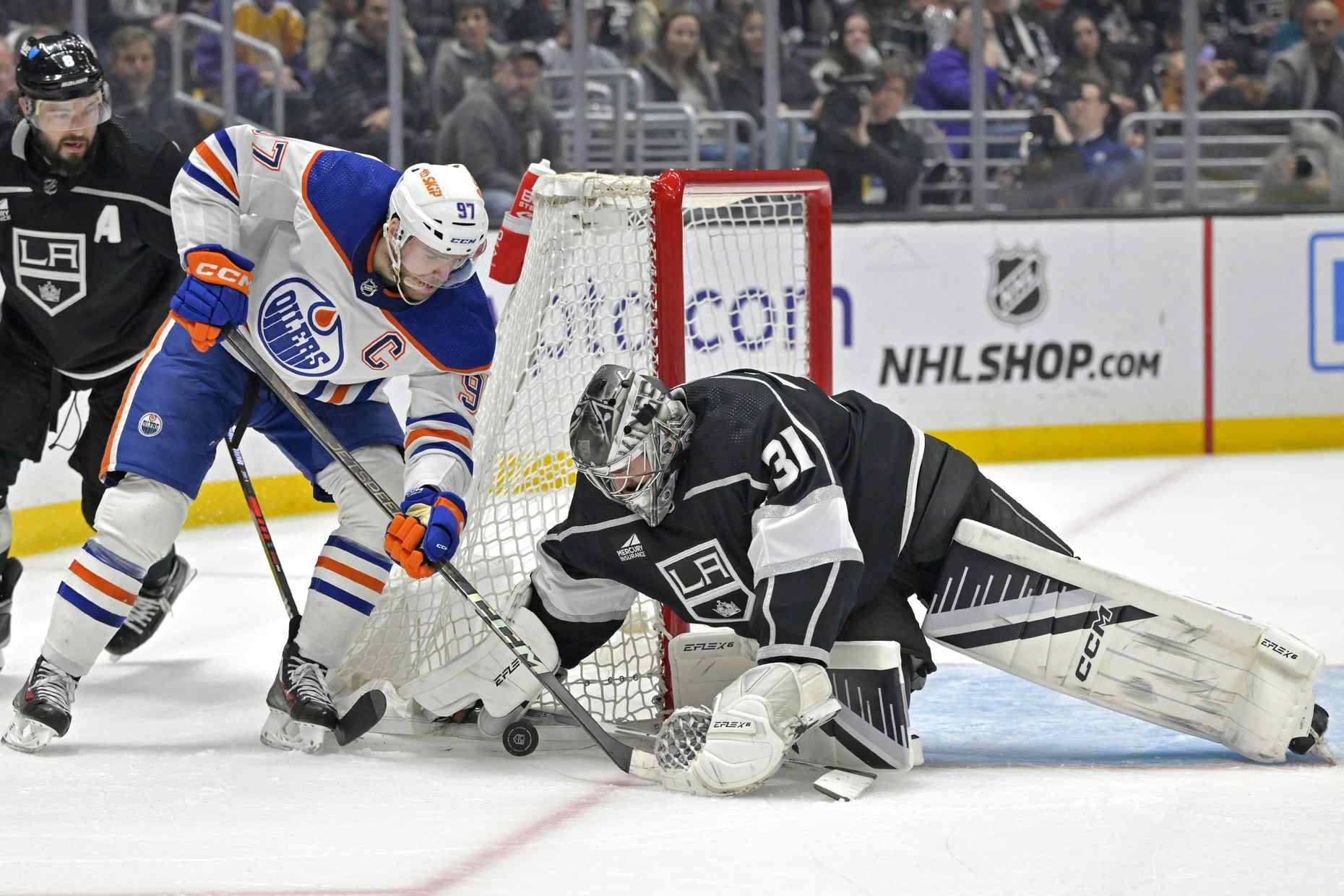CATCHING UP WITH JONES
By Jason Gregor
10 years ago
I can’t confirm if Ryan Jones celebrated like this when he signed a one-year deal with the Oilers last week, but the 29-year-old was excited he’s returning to Edmonton. Jones, like most of his teammates, has something to prove to his new coach and GM, and he is looking forward to the challenge.
Last week, Jones came on my radio show and we discussed his return to the Oilers, learning to become a competitive team and the bottom six becoming a productive group. The paragraphs in italics are my thoughts/comments.
Last week, Jones came on my radio show and we discussed his return to the Oilers, learning to become a competitive team and the bottom six becoming a productive group. The paragraphs in italics are my thoughts/comments.
Jason Gregor: Have you written the NHL, about overlooking John Tonelli for the Hall of Fame?
Ryan Jones: (laughs) I haven’t. I’m not sure that he’s quite hall material, but I’m a little shocked that he hasn’t even gotten a sniff in his time. I mean he’s put up good numbers. He’s won just about every level that he can, and he’s my cousin so, what else do you need?
Gregor: It’s true, 325 goals and almost 900 points, won 4 cups and was great for Canada in the Canada Cup.
Jones: It’s true. I think he’s got another 140 playoff games with probably 90 points mixed in there.
Gregor: Not bad. Did he teach you any hockey skills at a young age?
Jones: He didn’t, but I got to watch him a lot. I watched him when he was on Chicago, [Jeremy] Roenick was young then. Michel Goulet was there, Goulet was my brother’s favourite player. I did see him a little bit in L.A. and then he went to Quebec, retired in Quebec. Then the next year they won the cup. So he missed a few cups. Two finals, one with Calgary and one with L.A. so, he’s a winner.
Gregor: Your brother’s favourite player was Goulet, who was yours?
Jones: I was always a big Joe Sakic fan. I don’t know what it is; we played so similar I guess. That must have been why.
Gregor: Was Marty Reasoner your favourite player? He was compared to Joe Sakic once.
Jones: (laughs) It was Jason Strudwick and Joe Sakic. Those were my two favourite players growing up.
Gregor: Those are opposite ends of the spectrum. Strudwick was better in the shootout though, I’m sure that he’s told you that.
Jones: Oh for sure, almost every day!
Gregor: At the end of the year you talked about wanting to come back to Edmonton. You tested the free agency market for a bit, were you close to going anywhere else?
Jones: Um, I don’t know if I would say close to going anywhere else. There were teams that made the decision difficult. But ultimately I think that I expressed all along that I wanted to be back in Edmonton. I guess it took MacT a day to see what else was out there and ultimately it just led to me being back.
Gregor: Do you feel that because of your eye injury last year you have to prove you can go back to being a guy who scored 15, 17, 18 goals?
Jones: A little bit. Well not a little bit, yeah I definitely do. There are a lot of questions about whether the injury would have a lasting impact on my career and they’re very valid questions due to the severity of the injury. But it’s just something that takes time to get over.
When I got back to playing the shortened season, it was fresh. I played seven weeks after major eye surgery. You take a little time and you let your body and your mind adjust to what is now normal. I feel great now and I’m excited to come back, and I’m motivated.
*** I don’t see the Oilers winning consistently with only skilled players in their top-six. You need to mix in some complementary players to play with the skilled players. The Blackhawks are the best example. They have four great top-six forwards, Toews, Kane, Sharp and Hossa and then they mix in guys around them. If I’m Eakins I’d playJones, or someone like him, at least 20 or so games within the top two lines.***
BOTTOM SIX…

Gregor: Craig MacTavish didn’t have a very glowing report of his bottom six forwards, saying “some of them at best were a non-factor.” Will the players within that group want to prove their GM wrong?
Jones: Well I’m not sure about that. I think that the motivation from the bottom six, at least from what I’ve seen, is to know that you’re needed to win hockey games. And I’ve mentioned this before, you look around at the Stanley Cup finals and there was no one player that dominated for Chicago. [Bryan] Bickell had a great playoff series. So did [Brandon] Saad, [Patrick] Kane had a game with three goals [Jonathan] Toews was his usual self, he was solid all over the ice.
You can’t honestly say that one guy on that team, or even two guys on that team won the cup for them. It was top to bottom, everyone chipped in. That’s what we need, and I think that as a bottom six we need to take as much pride as our skilled guys do in being able to contribute in order to win hockey games.
Gregor: You mentioned when you came over from Nashville, that the Oilers locker room at the time wasn’t a very positive dressing room. What do you do to ensure that this team doesn’t mirror that and that you guys start to win and become more of a competent group?
Jones: Well I think that there are very different personalities in the locker room right now than there was back then. A lot of the guys that were in the room at that time, they had lost for a couple of years. It was starting to wear on them, you could tell. I think that with the young energy that we have in the room, and the excitement that they bring to the game, it’s enjoyable to come to the rink.
Guys around the locker room have a lot of fun, we feel the tension from the fans and from everybody wanting us to win and that’s something that we in the room want to do as well. I just think that as we mature and we learn to win hockey games, not saying that we haven’t in the past couple of years, you’ll see a lot more success for sure.
***The young players have an upbeat attitude, which is great, but now the entire team needs a more competitive attitude. Players need to challenge each other to play equally hard. Great leadership comes from those who battle hard every game and then expect their teammates to do the same. Look for Andrew Ference to be a leader in this department, and it is why I won’t be shocked if he is named captain.***
Gregor: Are you more comfortable on right wing or left wing, does it matter?
Jones: It doesn’t really matter. When Tom [Renney] was the coach I was right wing, when Ralph [Kreuger] was the coach I was left and right wing and pressbox and everything else. I’m pretty sure I’m comfortable on both sides. Surprised I didn’t play centre last year.
Gregor: Can you win a faceoff?
Jones: The funny thing is that I remember in my second game, the game that I scored my first goal, after I had scored my goal I was taking a faceoff against Mike Modano in Dallas at the far end. I know the exact dot and I beat him. So, that is almost even a bigger highlight than scoring my first goal that game.
Gregor: Do you remember some bad losses as well?
Jones: I think that if you look up the statistics I somewhere from 18-19% faceoff guy, maybe even a bit lower. I take maybe one every three weeks? So it’s tough. Those guys are good in the faceoff. I think maybe I’m going to start pushing forward and let the guys come in behind me.
Gregor: Speaking of faceoffs, the onus can’t just be on the centremen. Collectively do the wingers need to be better , especially considering your centres aren’t as physically mature or just don’t have the savvy of other teams?
Jones: I think that when you go out for a faceoff, and this is something that I do for myself, as soon as you get out for the faceoff dot you have to be right into it. You don’t know where it’s going to go and you have to be ready to help your centremen out. That’s something that Horc [Shawn Horcoff] always talked to me about. He was like ‘Just be ready. I don’t know where it will go, everybody’s good at faceoffs, it could squirt out to the side, and everybody has to be willing to battle against whoever it is.’
If you’re the net front guy, it’s always against the D, if you’re the winger on the boards it’s always against the D that’s going to go back and get the puck, so as the guy on the boards you have a little bit of an advantage because that D’s always trying to take a first step back.
I think that you’re completely right when you think of faceoff percentage everybody always thinks ‘well this centre is only 40%’ but there’s not many guys that just snap pucks back right away, there are very, very few. I think a lot of the faceoff percent has to do with who’s on their wings and whether or not they’re willing and able to get in and battle for the puck.
***The Oilers have to improve their faceoffs, and it has to be more than just the centres. Of course Gagner and Nugen-Hopkins need to improve, but I believe attention to detail has to be Eakins main focus this year. The Oilers need to improve in many of the small areas, before they become better in the easily noticeable areas. Losing battles on faceoffs has plagued this team for the past five years. Much of that is sheer determination and desire. The coach has to demand accountability in this area.***
Gregor: Have you had a chance to speak to your new head coach, and what have you heard about Eakins?
Jones: I haven’t had a chance to talk to him yet. I’m assuming that conversation will be coming very soon. Just from what I’ve heard, he’s a demanding coach, a man who respects his players and wants the same from them. He’s big into fitness which is good because legs feed the wolves. So that’s a good attribute to have from a coach.
I like to think that he’s an extension of MacT. I’ve heard that he’s a man of his words and when he says something he’s going to follow through with it.
So those are the coaches that you like because you know exactly where you stand at all times, you’re not sitting around wondering ‘I wonder if he likes me’ if you had a bad game or whatever. Pretty sure you’re going to know right away.
NEW CAPTAIN….

Gregor: Shawn Horcoff was traded recently so there is a vacancy for the captain. How does it impact guys in the room who gets the captaincy? Does it play a big factor?
Jones: A little bit, I’m not sure when it comes to this level of hockey, it’s beyond the political stuff that usually goes into it. When you’re a little kid, it’s usually your dad who gives you the C. When you get a letter in the NHL you usually deserve it. You’ve proven that you can be a leader and that you’re a guy that leads by example and that’s the biggest thing. It’s not so much what the guys are going to say in the locker room because most guys around the room, they know what’s going on at all circumstances.
And that’s something that Horc was good about. When something needed to be said, he said it. But other than that, and he didn’t get a lot of credit for it, but he was the hardest working guy off of the ice and on the ice most nights and that’s exactly what you expect out of a captain and leader.
*** I know many want Taylor Hall or Jordan Eberle to be the next captain, and one of them could be, but is now the right time? Hall has matured a lot the past few seasons, on and off the ice, and he’d gladly accept the challenge. Eberle is well respected within the room and he’s more vocal than people realize, and he’d love the responsibility. Eakins might want to give them the "C," to illustrate a new era with the team, but I believe Ference will receive significant consideration. He wore a letter on a Cup contending team the past few years, so he’d be an obvious choice.***
Gregor: Is it too simple to state that the Edmonton Oilers have a lot of talent and now it’s just a matter of matching that talent with a consistent work ethic and a desire to be competitive every game?. Is that what your team needs to learn the most?
Jones: It’s weird and maybe a little cliché to say that you need to learn to win, and I know that I’ve mentioned it before, but there is an education that goes into winning hockey games. You see it with the teams that have won a lot. Take Chicago for example; at the start of the year when they went on that long streak, they were winning a lot of games the exact same way. There was a couple of games where they went in and it was 7-2, 7-1 hockey games, but how many games was it 1-0 going into the last two minutes and they somehow found a way to score goals and then won in overtime and won in the shootout.
That team is confident in their abilities and they know how to win and they’ve learned how to win. That is something that we need to do. We need to be confident in our ability, individually, as a team, to know that no matter what the circumstances are we have a chance to be in every single hockey game. I think that once that confidence is there that we’ll take a big turn and hopefully it starts right at the start of this season.
Gregor: MacTavish, Eakins, a lot of players have talked about becoming a harder team to play against, and not with fisticuffs or big bruising hits. I’ve had Andrew Ference and Horcoff on the show recently and they both said, ‘The guys that you hated playing against are the guys who just never quit.’ Does this team have to be harder to play against and if so, how do you do it?
Jones: I think for sure we have to be harder to play against. One thing that you mentioned is the fighting, it’s going to be out of the game soon whether people like it or not. It’s slowly dwindling away and now all of the sudden these faceoff fights, people want to get rid of these faceoff fights. It’s just; it’s naturally found a way to be out of the game. I know that certain fans love it, and I get a ton of grief on Twitter about not fighting all of the time, it’s just there are certain times to do it and certain times not to do it and we have guys on the team that are very very capable of beating the snot out of other guys. Brown is one willing combatant as tough as nails and he knows the proper time to do it.
But outside of that, I think that you’re exactly right, I think of guys that are tough to play against and I’m with Ference and Horc, it’s always guys who no matter what the circumstances are, they never give up. You take the puck from them or you knock them down and you beat them and you think ‘well that guys out of there’ and he comes back and he’s giving you a bump trying to take it back from you. Those are the guys that are hard to play against, not the guys who are trying to take a run at somebody every time because ¾ of the time you don’t get hit anyways.
***The Oilers haven’t been hard to play against for years. It would be great to add some size and grit in their top-six, but even if they don’t, the guys who play the most minutes need to become harder to play against. Datsyuk, Toews, Crosby are incredibly hard to play against because of their skill, but mainly because of their work ethic. They do more than just produce points. The Oilers blueline has to become tougher in front of the net, on the boards and in battles for loose pucks. Every team has skilled players in their top-six forwards and top-four D-men, and the Oilers can’t expect to just win on skill. They need more desperation in their overall game.***
Gregor: Is that just a mentality, because obviously you guys have speed to skate with any team in the league. Does it just come down to having the desire and willingness to match the competitiveness of your competition?
Jones: That’s exactly what it is. I mean there’s the willingness and the want to win a battle, to win a race, to get to a loose puck, that’s 99.9% of the time the person who is more willing, you know who’s going to win the battle.
I’ve heard the saying before ’99.9% of the time the guy who is willing to die isn’t going to die.’ So it’s kind of the same thing. The person who is willing to do anything possible to win that battle will win it.
Gregor: Is that something that takes time to learn? A lot of your teammates were dominant at the lower levels, so they must have had that willingness then, or is it an even higher level when playing against the best of the best?
Jones: I think people underestimate the level of compete and the level of play in the NHL if they think it’s easy. I mean a lot of players have success in the American League and never make it to the NHL. A lot of guys have success in the WHL and never make it to the NHL. When you get here you’re competing against the most skilled, the best and the most driven. It’s something that until you’re in the situation, until you see someone and you are actually in a battle and lose a battle, you never know what it takes.
I’ve always paid attention to what fans say and it’s unbelievable how easy some people think that the NHL game is.
Gregor: You mean it’s a little bit harder than we think?
Jones: I always love ‘why didn’t you do this at this time?’ Well I was probably trying to do that, but there was another guy that was trying to stop me from doing it and sometimes it just doesn’t work the way that both you and I want it to. If it was I would have eight Stanley Cups right now.
Gregor: (laughs) If it was only that easy. Do you plan on hunting again this fall?
Jones: I do, and I mean that’s one thing that I’m passionate about; hockey and hunting. Hunting to me is kind of a getaway from the hectic life that hockey brings. When you get to go and just sit there in the tree stand or wherever it’s just quiet. You don’t have to think about the stress that comes with the job and then when you leave the field you’re kind of back to reality. It’s just a nice little escape whether or not you’re fortunate enough to harvest anything.
Plus everybody in the locker room loves deer jerky and I never hear the end of it if I don’t bring any in. So I have to go hunting or I’m not going to have any friends in the locker room. You should see Louie DeBrusk eat that stuff. (Laughs) He might eat the wrapper too; I have to take it off of the jerky so that he doesn’t just swallow the whole thing.
PARTING SHOTS
- The NHL hasn’t released the arbitration hearing dates yet, but they are scheduled between July 22nd and August 6th. Sam Gagner filed for arbitration, but I don’t think Oiler fans should be concerned.
- Just because Ilya Kovalchuk got home sick, doesn’t mean Nail Yakupov will. They are completely different people and different situations. Yakupov chose to play in the CHL for two years before being drafted. He likes it in Canada, and his family lived in Edmonton last season. It is premature to believe Yakupov has any intentions of following in Kovalchuk’s footsteps.
- I didn’t understand the Eskimos game plan on Saturday. It was pouring rain for the first three quarters, yet the Eskimos came out throwing the ball despite Fred Stamps, their best receiver, not playing. Why not run the ball, especially when Hugh Charles is your most dangerous weapon? Without Stamps and Adarius Bowman the Eskimos don’t have much speed in their receiving corps. The Esks led the entire first half, but kept throwing the ball. The play calling was perplexing, and mostly infuriating.
- The Open Championship (British Open) is this weekend. Tiger Woods has gone 20 majors without a victory. Jack Nicklaus’ longest drought was also 20, but that was at the end of his career. Nicklaus won his 17th major, 1980 PGA Championship, and then won his 18th (last of his career) at the Masters in 1986. His 2nd longest drought was 12 majors between the 1967 US Open and 1970 Open Championship. I’ve said for years I didn’t think Woods would pass Nicklaus’ 18 majors, and it looks more unlikely as each major passes by.
RECENTLY BY JASON GREGOR
Recent articles from Jason Gregor

